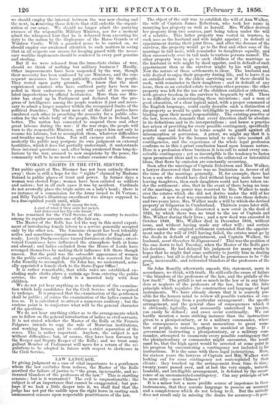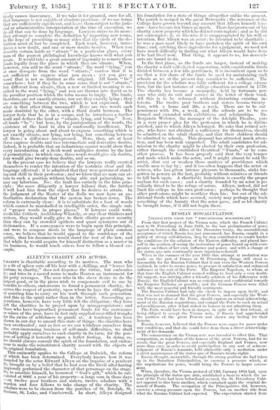LAW LANGUAGE.
IN giving judgment on a ease of vital importance to a gentleman 'Whom the law excludes from redress, the Master of the Rolls ascribed the failure of justice to "the gross, inexcusable, and re- iterated blunders of the professors of the law." This is startling censure ; but is it warranted? The evil is unquestionable ; the subject is of an importance that cannot be exaggerated ; but per- haps if we look a little deeper into it, we shall find that the judge has not put the saddle upon the right horse in casting such unmeasured censure upon respectable practitioners of the law.
The object of the suit was to establish the will of Ann Walker, the wife of Captain James Robertson who took her name in
marrying her property as well as herself. Mrs. Walker derived her property from two sources, part being taken under the will of a relative. This latter property was vested in trustees, to such uses as the husband and wife might appoint; in default of appointment during their joint lives, and after the decease of the survivor, the property would go to the first and other sons of the marriage in tail male, with remainder to daughters equally, and then successively over in tail male to various persons named. The other property was to go to such children of the marriage as the husband or wife might by deed appoint, and in default of such appointment then as the survivor might by his will appoint. Now the nature of these settlements is clear. The husband and wife desired to enjoy their property during life, and to leave it as an entailed estate to the eldest surviving son if there should be such, with remainder to their daughters ; and in default of any issue, then as an entailed estate to certain other persons : the other property was left for the use of the children entailed or otherwise, with greater freedom in the survivor to bequeath by will. There is no difficulty in understanding these intentions ; and a man of good education, of a clear logical mind, with a proper command of the English language, could easily describe such a distinction of the property as would be quite intelligible to persons of sense, and binding upon their moral responsibility. The existing practice of the law, however, demands that every direction shall be absolute in its definitions and in its interpretations ; and hence a practice has arisen of providing for every possible contingency, specifically pointed out and defined in terms sought to guard against all misconception or perversion. A priori, we might say that it is nearly impossible for the human mind to take into account all contingencies, and the experience of the whole legal profession confirms us in this a priori conclusion based upon human nature. Here is a profession whose business it is to call to mind every con- ceivable contingency ; yet so incorrigible is the tendency to fasten upon prominent ideas and to overlook the collateral or interstitial ideas, that flaws by omission are constantly occurring; Soon after the marriage of Captain Robertson and M. s Walker, a lawyer discovered that there was no limitation in favour of all the issue of the marriage generally. If, for example, there had been a son who should have died without leaving male issue but leaving daughters' then such daughters could not have taken un- der the settlement: also, that in the event of there being no issue of the marriage, no power was reserved to Mrs. Walker to make over the estates which she did not derive under the will of her brother. A new deed was executed in 1825 to cure these defects; and two years later, Mrs. Walker made a will by which she devised property at Gilgarran in Cumberland. Thirteen years later still, the soheitor of the couple discovered a new error in the deed of 1825, by which there was no trust to the use of Captain and Mrs. Walker during their lives ; and a new deed was executed in October 1840. Mrs. Walker died in December 1854, without issue, and without having made any other will; and certain parties under the original settlement contended that the appoint- ment under the will of 1827 having failed, the estates must go by the deeds in default of appointment, and Captain Walker, the husband, must therefore be dispossessed! This was the position of the case down to last Tuesday, when the Master of the Rolls gave his decision. He had delayed his judgment for many weeks in hopes that he might find some authority to justify him in dealing out justice ; but all is defeated by what he pronounces to be "the ffoss, inexcusable, and reiterated blunders of the professors of the Sir John Romilly afterwards amends this statement, more in accordance, we think, with truth. He still calls the cause of failure "the blunders of the professors of the law, and the pitfalls of the law itself." The pitfall is not so much in the law or in any blun- ders or neglects of the professors of the law, but in the false principle which regulates the construction and language of legal instruments. We have already. shown that it is scarcely pos- sible for the human mind to review all possible varieties of con- tingency following from a particular arrangement : the specific arrangement, and the general class of consequences which it is obviously, logically, and necessarily understood to involve, can easily be defined ; and cases occur continually: We can hardly mention a more striking instance than the instructions given to a plenipotentiary, or to a military commander, where the consequences must be most momentous to great num- bers of people, to nations, perhaps to mankind at large. If a government instructing a plenipotentiary, or a military com- mander, attempted to enumerate every possible contingency that the 'plenipotentiary or commander might encounter, the result must be, that the high agent would be arrested at some point in Ins progress by encountering a contingency not included in his instructions. It is the same with these legal instructions. Here, for sixteen years the lawyers of Captain and Mrs. Walker were looking out for some contingency not contemplated by their clients : they touched up the arrangement from time to time; twenty years passed over, and at last the very simple, natural,
• laudable, and intelligible arrangement, is defeated by the occur- rence of an unenumerated contingency. Can any principle of law be more silly—more Chinese ?
It is a minor but a more prolific source of impotence in these instruments, that they assume language to possess an accuracy and a completeness which do not belong to it. But the mistake does not result only in missing the desire for accuracy—it poi- tively causes inaccuracy. If we take it for granted, once for all, that language is not capable of absolute precision—if we use terms that are sufficiently significant, and leave them subject to the judi- cial or administrative interpretation at the time of execution, we do all that can be done by language. Lawyers strive to do more : they attempt to complete the definition by importing new terms, in the hope of presenting so many sides that the circle of the de- finition must at last be completed. Each word, however, intro- duces a new doubt, and one or more doubts besides. When you describe certain lands as "situate" in a particular place, every man of the poorest philological knowledge knows well what you mean. It would take a great amount of ingenuity to remove those lands legally from the place in which they are situate. When, however, you add to the word "situate," the word "lying," you at once derogate from the word. "situate," confess that it is not sufficient to express what you mean ; yet you give a word that is not so 'distinct as the original. All lands " lie " somewhere ; but if they lie in some sense that is not "situate," but different from situate, then a new or limited meaning is as- cribed to. the word "lying," and you are thrown into doubt as to the peculiar position which the term means to imply. The lands, therefore, are not exactly situate, nor are they exactly lying ; they are something between the two, which is not expressed. But what is that other thing unnamed? Here are two words each made doubtful by the other, with a third doubt between. The lawyer feels that he is in a scrape, and he introduces a further word and defines the land as "situate, lying, and being." Now, all lands " be " ; but here, by the juxtaposition of the words, the existence of the land in situ is confessedly insufficient. The lawyer is going about and about to express something which is not exactly situate, nor lying, nor being, but something between all these ; a difference unexpressed. Here, then, are at least three express doubts and two intermediate and derivative doubts. Indeed, it is probable that an industrious casuist would show that every introduction of a fresh word multiplies doubts by the law of permutation ; in which ease, three words would give six doubts, four would give twenty-four doubts, and so on.
In the present ease we believe that the lawyers really exerted themselves to render the intention of the testatrix clear and the language effectual : it is admitted that they were persons of stand- ing and skill in their profession ; and we know that no man can at- tam to such a position without being able and painstaking, we may say laborious. No; the fault lies entirely in the false prin- ciple: the more diligently a lawyer follows that, the further it will lead him from the object that he desires to attain. In the judgment of the Master of the Rolls we now have an au- thoritative declaration that the system has broken down. The reform is extremely clear : it is to substitute for a host of words which cannot be marshalled in intelligible order, the simple rule of "proper words in proper places." If lawyers could write deeds like Cobbett, Archbishop Whately, or any clear thinkers and writers, they would really give to their clients greater security than they can by crowded epithets and quasi synonyms out of dictionaries. If a conveyancer were to begin upon this principle, and were to compose deeds in the language of plain common sense we believe that he would appeal to the confidence of the public, that his documents would stand the test of the law, and that while he would acquire for himself distinction as a master in his business, he would teach others how to follow a blessed ex- ample.











































 Previous page
Previous page